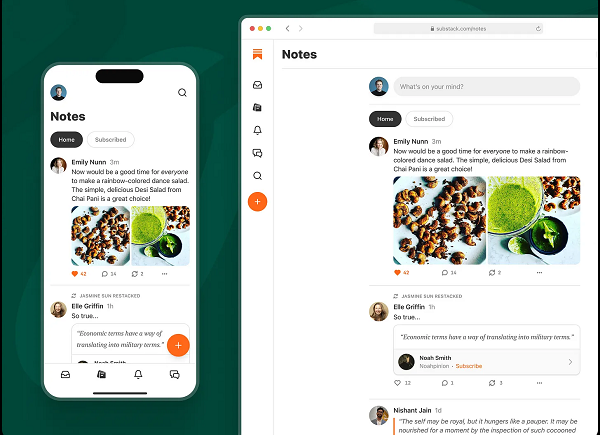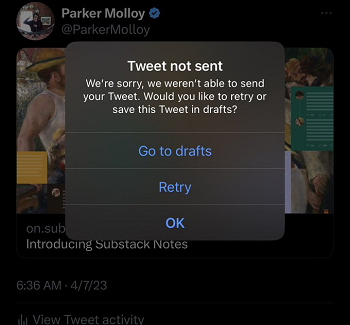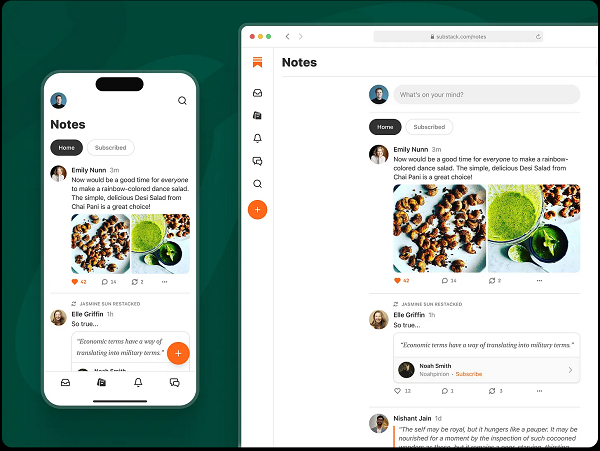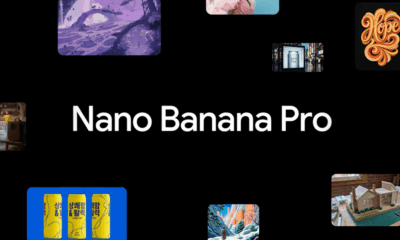SOCIAL
Twitter Restricts Linkage to Substack, Raising Questions About ‘Free Speech’ in the App

Elon Musk’s interpretation of ‘free speech’ is again being questioned, with Twitter restricting users’ capacity to share links to Substack newsletters, while also stopping Substack users from embedding tweets in their content.
Over the last two days, Twitter and Substack users have been seeing warnings pop-up, in both apps, when trying to link to the other.
On Substack, when authors have attempted to embed a tweet, they’ve been seeing this error message:
While on Twitter, sharing Substack links has been limited, while trying to engage with posts that refer to Substack content has also been halted.

Why? Well, it’s likely because of this:

Earlier this week, Substack previewed a new, Twitter-like ‘Notes’ element, which will seemingly replicate Twitter functionality within the platform itself. Elon does not like copycats, as he’s previously made clear, and it seems that Twitter is now taking action to punish Substack for its perceived insolence.
There’s been no official explanation from Twitter on this, but the Substack team has put out a statement, criticizing Twitter for restricting its access.
“We’re disappointed that Twitter has chosen to restrict writers’ ability to share their work. Writers deserve the freedom to share links to Substack or anywhere else. This abrupt change is a reminder of why writers deserve a model that puts them in charge, that rewards great work with money, and that protects the free press and free speech.”
Which is interesting, given Musk’s very vocal support for free speech principles, calling himself a ‘free speech absolutist’, and presenting this as a key reason for his $44 billion purchase of Twitter. But as noted, history suggests that Musk’s view on free speech likely differs from what you’d think.
Musk’s track record on this actually goes back beyond his purchase of Twitter. In late 2021, for example, Musk tried to stop a Twitter user from sharing details of his travels on his private jet, a case which later became an even bigger point of contention once he purchased the app.
The ‘ElonJet’ account, which displayed where and when Elon’s jet was traveling, using publicly available flight info, was initially showcased by Musk as an example of his commitment to free speech, by allowing it to continue, despite it revealing information about his movements. But then, last year, Elon banned the account anyway, as he implemented new rules at the app which outlawed all forms of live location tracking of individuals via tweet.
So free speech is okay, except when it could, potentially, be harmful to Elon, or even inconvenient – yet that same logic is not applicable to others, like when Elon baselessly accused a cave diver of being a pedophile in 2018, which has since led to ongoing harm for that individual.
Musk’s companies also have a history of seeking to stifle competition, or even critical reviews, where possible.
Last year, Musk’s EV company Tesla launched legal action against a car reviewer who criticized the Tesla Model 3’s auto-braking system. The reviewer, who had a prominent TikTok channel, claimed that Musk’s company released his personal information, and paid for social media campaigns to magnify the lawsuit against him, in an effort to discredit and make an example of him.
So again, free speech is fine, except when it’s potentially harmful to Musk or his business interests. Which, you would assume, would also mean that Elon would have some pretty good perspective on the potential harm that can be caused by absolutely free and open speech, with no restrictions, given that he’s been trying to limit such around his own personal brand for years.
But alas, no, that’s not how Musk sees it. Because his perspective on the world is different to yours, because he’s one of the richest people on the planet, and his experiences are not the same.
Even in his time as Twitter chief, Musk’s actions have not reflected free speech ‘absolutism’, even, as Musk says, within the limits of the law.
In December last year, Elon banned all links to other social platforms via tweet, as means to stifle competition (which was later reversed), while Musk has also cut off all third-party developers that created Twitter-like experiences in their apps. Elon has also suspended journalists for saying things he didn’t like, while he’s also complied with requests from the Indian Government to take down unfavorable content, something that previous Twitter management had made a stand against.
This is not ‘free speech’, as Musk has repeatedly stated. In fact, in some cases, it’s almost the exact opposite, with Musk seeking to use Twitter as a means to minimize negative reports about him and his business – or really, anything that he just doesn’t like, because he can.
Which may be the broader focus for Musk in purchasing the platform, the capacity to use Twitter as a means of narrative control, in order to dilute or control reportage by manipulating the media cycle.
As many have noted, Twitter has an outsized influence in this respect because it’s relied upon by so many journalists. The speed of delivery makes Twitter the perfect platform for staying up on the latest news, and what’s tweeted now often becomes the leading news of the day, as reporters work to get the latest scoop, as fast as possible.
Former President Donald Trump weaponized this element, using tweets to share his messaging, quickly and easily, which often saw his tweeted comments becoming the main media focus at any given time. That also enabled Trump to shift that focus whenever he needed, by tweeting out controversial takes to gather up attention at opportune times.
Musk may well be doing the same. For example, earlier this week, Twitter changed its traditional bird logo to a Doge icon, which is also the symbol for Dogecoin, which comes as Musk is being sued for $258 million over promotion of Dogecoin to artificially inflate the cryptocurrency’s price.
The change meant that if you went searching for stories about ‘Elon Musk’ and ‘Dogecoin’, the bulk of coverage was about Twitter changing its logo, not about the more negative Musk racketeering lawsuit.
Maybe, that could be a means of narrative control, or manipulation of media trends – and again, given that so many journalists rely on Twitter to stay informed, Musk could have an outsized influence in this respect.
Which also raises questions about what ‘free speech’ actually means when Musk says it, and whether your interpretation of such is the same in context.
Even today, with Twitter updating its rules around Abuse and Harassment, Musk has said that users have to go ‘over-the-top by repeatedly harassing the same account with no provocation to get their post bounced’. Will that apply to Elon himself? If you were to repeatedly harass Elon directly, would he be as open to allowing you to stay in the app?
The nuances here are significant, and when you view Elon’s words, in comparison to his actions, there’s a mismatch in approach, which is significant.
You may support Elon’s stances, but how they’re applied is equally worth noting.

















